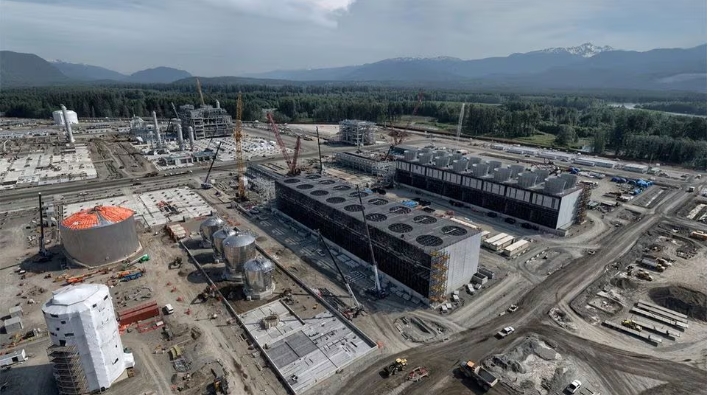
British Columbia boosted its C$36 billion ($26.7 billion) plan to expand its grid over the next decade, but Canada's Pacific Coast province will still fall short of supplying the biggest liquefied natural gas (LNG) projects with hydropower needed to avoid generating high emissions.
Long regulatory processes mean a critical northern transmission line expansion will only be ready years after LNG plants start operating and droughts are already curbing British Columbia's (B.C.'s) power generation.
B.C. boosted its electricity grid spending plans on Tuesday by 50%, as demand soars from industry for renewable hydropower and as the province switches to electric vehicles and electric heating in buildings.
"It's a huge challenge to meet all the potential demand for electricity - daunting," said Barry Penner, a former B.C. environment minister and now chair of Energy Futures Initiative, a program of advocacy group Resource Works.
Supplying hydropower to LNG projects, including Shell (SHEL.L), opens new tab-led LNG Canada, is critical to the goals of the province and Canada to cut emissions sharply by 2030. LNG export facilities would tap into lucrative offshore demand for Canadian natural gas.
LNG Canada, which is 90% complete, will run its 14 million-metric ton per annum facility on high-emission natural gas, complicating Canada's net-zero goals. The company, which is considering a second phase that may switch to grid power once it's available, said in a statement on Thursday it is encouraged by government efforts to expedite electricity expansion.
The key part of B.C.'s grid plan for LNG Canada is the C$3 billion expansion of a northwest transmission line. Building it would take up to 10 years because of the need for agreement with First Nations and permitting, BC Hydro CEO Chris O'Riley said.
"We're all committed to getting these projects built as quickly as possible and we all want them to run on electricity. That's our goal," O'Riley said in an interview.
BC Hydro's timeline means the transmission line won't be expanded until the early 2030s, after LNG Canada and rival proposals Ksi Lisims LNG and Cedar LNG are running.
FIRST NATIONS SUPPORT
A capacitor station project in northwestern B.C. will provide sufficient power for Cedar LNG, a project of the Haisla Nation and Pembina Pipeline (PPL.TO), opens new tab, O'Riley said. Ksi Lisims plans to start up as early as 2028.
First Nations support for the northwest transmission line could accelerate the regulatory timeline. K'uul Power, a consortium of 11 First Nations, is in talks to buy 50% of the project from BC Hydro.
"If you're in charge, then you're OK with going fast because you can protect your interests," said K'uul CEO Alex Grzybowski. "An expedited process is entirely on the table."
B.C. has formed a task force to speed up permitting for clean energy projects.
B.C., like Quebec, whose government-owned Hydro Quebec utility released its own long-term plan for grid expansion in November, relies on hydro for most of its power. That resource and B.C.'s coastal ports have made it the center of Canada's nascent LNG industry. Neighboring Alberta by contrast relies on high-emission natural gas to generate power.
Droughts pose another challenge for B.C. BC Hydro imported a record one-fifth of its 2023 power needs as drought cut hydropower generation.
BC Hydro plans to add wind and solar generation to help hedge the drought risk, O'Riley said.
But B.C. may still lack sufficient power to satisfy all industries, from LNG to mining of critical minerals and hydrogen proposals, said Evan Pivnick, program manager at Clean Energy Canada.
"One of the key questions that B.C. is going to have to confront is, which industries is it prioritising?" Pivnick said.